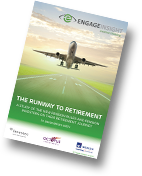So here we are, ‘R’ day has passed and we’re now at the beginning of a whole new era in retail financial services that demands high professional standards, interventionist regulation and transparency and accountability at all stages of the service chain.
The underlying theme to the RDR journey can be summed up as a passage to a relationship driven business, where adviser firms meet increased regulatory scrutiny, investment performance meets high client expectations and unbundled charges and fees meet transparency and accountability.
During December, in partnership with Capita financial solutions, we conducted a national market research survey across regulated adviser firms, which covered 9 key strategies that needed to be addressed comprehensively in time before the R day cliff edge. The results surprised us.
There were 5 defined themes that arose form the data compiled which were telling in the adviser community’s attitude to RDR compliance and key areas that quite literally can determine success or failure.
1. Future proofing the business model:
Next generation firm’s that are to thrive in a relationship driven economy have to ensure they have robust risk management strategies, adaptable and flexible to market and regulatory directives and are quite simply client centric.
Our survey results point to a lack of confidence that business models are strong enough to support fee based charging. This is understandable as we stand at the start of a new remunerative process.
Our advice would be for advisory firms to test, retest and test again their customer agreed remuneration strategies, and take a view on charging clients directly rather than relying on the product’s to facilitate.
2. Lead from the front:
Never before has there been a clear need for strong leadership across the firms board. Issues such as adviser charge facilitation, staff training and competency standards, client and regulator communications and corporate governance were a clear challenge to the adviser firms questioned.
The data indicated a clear need to understand the behavioural economics at play such as inertia in a reliance on old style transactional business models, overconfidence in client relationship loyalty and loss aversion in hanging on to a ‘commission mind-set’ in a lack of clarity around the advice charge process.
The industry now needs leadership qualities that balance the regulatory demands with commercial pressures, which bring a need for strong vision, confidence and trust building where a culture for fiduciary relationships with all stakeholders are at the heart of all the firm does.
3. Client centric services:
Most firms believed their services are client orientated which is great. But there was a clear conflict when asked about advice suitability and risk profiling. Over 60% believed that advice suitability could be compromised by lack of synergy with fund KID SRRI’s and client risk profiles.
This along with the fact that the research highlighted business models are transactionally based with no uniformity in the advice processes used, means there is still work to be done in ensuring client’s needs are met, with issues such as VAT and adviser charging and potential conflicts of interest where providers do not support ACF.
4. Back, middle and front office support:
Business support systems that are RDR ready seem to cause a mixed response. Whilst the majority of respondents feel their back office system is RDR ready, there appears to be a lack of confidence in the capability to support the middle ground (research tools) and front office functionality (advice process). Also quite worryingly 44% of respondents felt unsure that their compliance functions met regulatory corporate governance standards for tracking adviser RDR progress.
With some excellent business support tools and systems available there is an obvious need for firms to re-visit their operations and business support to ensure all regulatory needs are covered and training requirements met.
5. Relationship management:
Quite surprisingly the Communication section of our survey scored the lowest. This means that important areas covering the management of key stakeholders such as clients and the regulator need to be addressed urgently.
Only 50% of firms seemed clear on the type of client relationship they want and less than half (48%) felt their clients understood the service proposition. There were also no surprises when only 26% felt communications received and given by the regulator were satisfactory.
The new relationship economy demands careful brand building, enhancing the client engagement experience, and leveraging client touch point strategies with technologies such as social media, website search engine optimisation, and designing a service clients will value.
With 40% of respondents unsure what makes their business different from the competition, there is a clear need for firms to build and focus on relationship capital not financial capital. This will encourage a move away from running the business through the ‘rear mirror’ in chasing trail incomes and the financial value the client offers. This only promotes short-term thinking.
Our survey showed that there is progress being made but still much to do. By looking at the firm through their clients eyes and building business services around the desired relationship the stakeholders (including the regulator) want with the advisory firm, this can not only facilitate an increase in the firm’s value but can also ensure compliance with all the RDR demands.
By using smart techniques to enhance the firm’s relationship capital, only then can firms be confident they will thrive in this new relationship economy.













